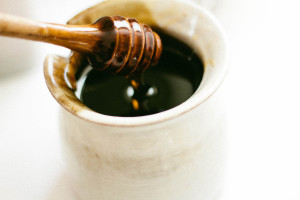
Photo by Sonja Langford, Unsplash
Lately I’ve noticed a lot of buzz about home remedies. I’ve read about eating coconut for stomach troubles, using milk of magnesia as deodorant, and I’ve noticed a movement growing surrounding the purported benefits of essential oils. One home remedy I hear about the most is the potential benefit of eating local honey to treat seasonal allergies caused by plant pollen.
The theory behind using local honey as an allergy treatment is that bees collect local pollen to make honey, so by eating local honey, you expose yourself to a little bit of what you’re allergic to desensitize yourself to it—this is called “immunotherapy.” Allergy shots are a form of immunotherapy—patients are exposed to larger and larger doses of an allergen to build up immunity to it.
Immunotherapy: Local Honey contains Local Pollen
On the surface, the theory behind using honey as immunotherapy seems like a sound one, but there’s no way to determine exactly which plants the bees are collecting pollen from to make the honey. Allergy shots target specific allergens, but eating local honey is a bit like rolling the dice. Bees also prefer collecting pollen from flowers but most allergies generate from the pollen of grasses, trees and weeds, not flowering plants. The honey that bees produce is from local pollen, but not necessarily from sources that cause common allergies and not in any targeted way like an allergy shot. A 2002 study in the Annals of Allergy, Asthma & Immunology showed that eating local honey didn’t improve allergy symptoms. Study participants that ate local honey didn’t fare any better than participants eating processed honey or taking a placebo.
There’s also a slight risk in consuming local honey that’s unprocessed—it can contain bacteria, mold, pollen and even bee parts that in rare cases, can cause an allergic reaction. Unfortunately, this home remedy doesn’t hold up, but the good news is that honey is still a great way to add a touch of sweetness to my afternoon cup of tea!
Additional Resources on Spring Allergies
Want to test your knowledge on other spring allergy myths? Check out this post, “Fact or Fiction? Spring Allergy Myths Debunked.”





















